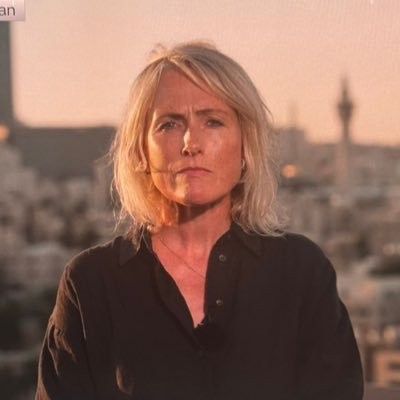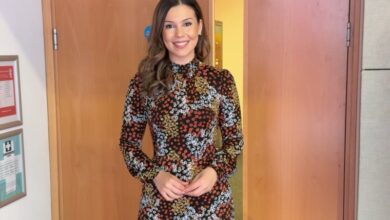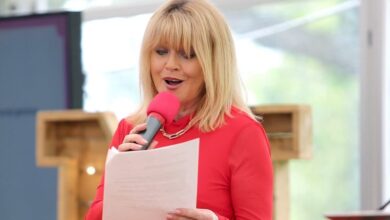Diana Magnay: International Correspondent Whose Reporting Bridges Conflict, Context, and Clarity

Diana Magnay is a London-based journalist, broadcaster, and international correspondent for Sky News. She has built a career reporting from some of the most complex geopolitics of our time, with deep field experience across Russia, Ukraine, the Middle East, Europe, Africa, and North America. Known for her calm on-air presence, incisive analysis, and grounded storytelling, she blends first-hand reporting with a strong academic grounding in history and war studies.
Diana Magnay: Education and Intellectual Foundations
Oxford to King’s—The Making of a Foreign Correspondent
-
BA (Hons) in Modern History from the University of Oxford, where she won the Arnold Modern History Prize for Best Thesis.
-
MA in International Peace and Security from King’s College London’s Department of War Studies, graduating with Distinction and the Director’s Prize for International Peace and Security.
This dual training—rigorous historical method alongside contemporary security studies—shows in her reporting style: context-rich, historically literate, and attentive to how present crises echo earlier fault lines.
Career Trajectory of Diana Magnay
Early Career and CNN (London & Berlin)
Magnay’s early years in television news spanned producing and output roles in London before she moved into the field. At CNN’s Berlin bureau she evolved from bureau producer into an international correspondent, covering the eurozone debt crisis, mass protests, natural disasters, the aftermath of terror attacks, the sexual-abuse scandal in the Catholic Church, and Russia’s growing assertiveness in its neighbourhood. She reported from Ukraine during the Crimea crisis, helping international audiences understand the “little green men” phenomenon and the unfolding dynamics around unmarked forces and hybrid warfare.
Diana Magnay in Africa
In 2015 she filed as an international correspondent from Johannesburg, covering stories across the African continent. Assignments included xenophobic violence in South Africa, Boko Haram, and the public-health and social dimensions that followed Ebola-related crises in West Africa. The African beat sharpened her focus on the interplay between security, governance, public health, and media narratives.
Channel 4 and Syria Coverage
As a foreign affairs correspondent with Channel 4, Magnay worked largely in-house while reporting international developments—particularly the Syrian conflict, including ceasefire claims, evacuations, and civilian displacement. These years consolidated her fluency in Middle Eastern theatres and the regional actors that shape them.
Diana Magnay at Sky News: Moscow and Beyond
Moscow Correspondent (2018–2024)
From 2018 to 2024, Diana Magnay served as Sky News’ Moscow Correspondent, ultimately leading the bureau before and through the first two years of Russia’s full-scale invasion of Ukraine. Her work spanned:
-
Pre-war military posturing, NATO-Russia friction, and domestic political climate inside Russia.
-
The invasion’s first-order shocks across Ukraine and its second-order effects on Russian society, sanctions, information flows, and dissent.
-
Major milestones including questions to President Vladimir Putin, coverage of the Navalny memorial, and documentaries on the “home front”—how war strains and reshapes everyday life, industry, and state narratives.
Her Moscow tenure is a defining period in her career, aligning sustained on-the-ground reporting with measured analysis that avoided sensationalism, while still conveying the human stakes.
International Correspondent (2024–present)
After a brief career break in 2024—during which she pursued creative non-fiction writing and completed a 200-hour yoga teacher training—Diana Magnay returned as Sky News International Correspondent. Based in London but frequently on the road, she has reported from Washington DC, Israel, Canada, Syria, and elsewhere. This role widens her remit beyond Russia/Ukraine to global flashpoints and policy hubs, deepening her comparative perspective across theatres.
Signature Reporting Style of Diana Magnay
Field-Led, Context-Heavy, Human-Centred
Magnay privileges field reporting—places, people, and particulars. Her dispatches typically weave:
-
Immediate scene-setting (sounds, sequences, timelines).
-
Historical and legal context (treaties, prior conflicts, political doctrines).
-
Lived realities of civilians, soldiers, and aid workers—voices that form the ethical core of the story.
Analysis Without Jargon
While she draws on war-studies concepts when useful (deterrence, hybrid warfare, irregular conflict), Diana Magnay keeps analysis plain-spoken. She avoids technocratic fog, instead showing how policy choices translate into local costs, whether energy prices in Europe, displacement in the Middle East, or mobilisation pressures in Russia.
Multimedia Range
From live shots and documentaries to podcasts, blogs, and long-form analysis, Magnay adapts the format to the story. The through-line is clarity: explaining not just what happened, but why it matters and what could follow.
Major Coverage Themes in Diana Magnay’s Work
Russia and Ukraine
-
Pre-invasion diplomacy and miscalculation.
-
Information control, propaganda ecosystems, and dissent.
-
The human geography of war: displacement, funerals, and everyday endurance under strain.
-
Sanctions, industry, and the wartime economy inside Russia.
The Middle East
-
Periodic escalations in Israel and the Palestinian territories, ceasefires and their fragility, humanitarian access, and regional diplomatic balancing.
-
Syria: the evolution from civil uprising to multi-front conflict, ceasefires, reconstruction claims, and the international legal challenges that follow.
North America and Transatlantic Policy
-
Washington DC as a producer of security policy and political narrative.
-
Shifts in alliance management, intelligence sharing, and the ripple effects for European security, NATO posture, and conflict diplomacy.
Europe and Global Affairs
-
Berlin vantage: how German and EU debates over security, energy, and migration shape wider policy.
-
Earthquakes, protests, and disasters: how states perform under pressure and how communities self-organise to cope.
Skills and Professional Strengths of Diana Magnay
Investigative Curiosity and Editorial Discipline
Magnay’s career reflects methodical verification, careful sourcing, and editorial restraint—qualities that keep audiences informed without inflaming speculation. She is known for asking clear, direct questions that surface substantive answers.
Cultural Sensitivity and On-Air Poise
Her cross-regional track record demonstrates cultural sensitivity—an ability to listen, to avoid parachute clichés, and to frame stories with respect for local knowledge. In live settings, she maintains poise under pressure, a hallmark of seasoned correspondents.
Communication Range
Beyond traditional packages, Diana Magnay writes analysis pieces, participates in podcasts, and hosts video explainers. That multiplatform range helps her meet audiences where they are, without sacrificing depth.
Accolades, Training, and Professional Development
-
Distinction and Director’s Prize at King’s College London’s War Studies, signalling both intellectual rigour and research excellence.
-
Arnold Modern History Prize at Oxford for best thesis, an early indicator of analytical and writing strength.
-
Yoga teacher training (200 hours) completed during a sabbatical—relevant not as a credential in journalism, but as an insight into her approach to resilience, focus, and sustained fieldwork.
-
Ongoing creative non-fiction practice, which informs narrative structure and long-form storytelling.
The Editorial Voice of Diana Magnay
“Tell It How It Is”
Magnay is explicit about her journalistic values: tell it how it is, in whatever format best conveys the truth of the story—television, podcasts, analysis, or on-the-ground blogs. Her reporting aims to cut through noise and binary spin, to recover texture and proportion in public discourse.
Empathy and Accountability
Her pieces often feature ordinary people in extraordinary situations—civilians negotiating conflict, families mourning losses, small businesses adapting to sanctions or supply shocks. By centring those voices, she insists that policy and power be judged by their real-world consequences.
Why Diana Magnay Matters in Today’s News Ecosystem
In an era of rapid narratives and fragmented attention, Diana Magnay offers depth over speed, nuance over outrage, and verification over virality. She draws lines from historical causes to present effects, showing how earlier compromises, doctrines, or misperceptions shape today’s conflicts. This is why her work resonates with audiences seeking understanding rather than headline churn.
Frequently Asked Reader Questions About Diana Magnay
Where Is Diana Magnay Based?
She is based in London but travels frequently as an International Correspondent. Her beats span Washington DC, the Middle East, Europe, and conflict zones where conditions permit responsible reporting.
What Are Diana Magnay’s Areas of Expertise?
-
Russia/Ukraine: political dynamics, war reporting, society under strain.
-
Middle East: escalations, ceasefires, humanitarian conditions, regional diplomacy.
-
Transatlantic policy: defence, intelligence partnerships, and alliance politics.
-
Crisis communication: conveying complex events with clarity and proportion.
Is Diana Magnay’s Personal Life Public?
Magnay is a public figure for her journalism, not her private life. Available public information focuses on her career, education, and reporting; personal details such as age or partner are not prominent in reputable records, reflecting a professional boundary many correspondents maintain.
Final Word: The Continuing Relevance of Diana Magnay
Diana Magnay represents a model of contemporary foreign correspondence: a blend of historical literacy, security-studies acumen, and ground-truth reporting delivered across platforms. Whether standing live in a conflict zone, querying leaders in a press hall, or assembling a long-form piece that maps causes to consequences, she brings clarity, context, and compassion to the stories that shape our world. As international affairs grow more interconnected—and more contested—voices like hers remain vital to public understanding.



